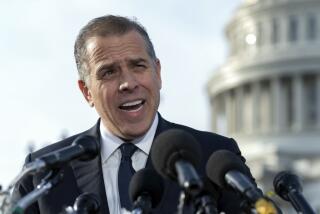U.S. Sues Bush’s Son : $200 Million Sought Over Failed S
- Share via
WASHINGTON — Federal regulators filed a civil suit today against President Bush’s son, Neil, and other officers of the bankrupt Silverado Banking, Savings & Loan Assn.
The suit, filed by the Federal Deposit Insurance Corp., seeks damages of $200 million.
The suit accuses the directors of “gross negligence,” according to a statement by the agency.
“Our conclusion is that Silverado was the victim of sophisticated schemes and abuses by insiders and of gross negligence by its directors and outside professionals,” FDIC Senior Deputy General Counsel Douglas H. Jones said in a statement.
Neil Bush served on the board of the institution from August, 1985, to August, 1988. It was seized by regulators on Dec. 9, 1988. The failure cost taxpayers an estimated $1 billion.
“We are seeking in this case to recover every available dollar for the federal deposit insurance funds and the American taxpayers,” Jones said.
The suit was filed in U.S. District Court in Denver. It was released by the FDIC in Washington.
In addition to Bush, officials of the Denver-based Silverado named as defendants were: Michael Wise, chairman and chief executive officer; Robert Lewis, chief financial officer; Richard Vandapool, chief operating officer; Russell Murray, executive vice president; W. James Metz, who owned 88% of Silverado’s stock, and board members Florian Barth, Richard Bunchman, Diane Ingels, Marjorie Page and Richard Vitkus.
The FDIC said improper loans and investments were made by Silverado’s officers and approved by its directors. Many of the transactions violated federal regulations, it said.
The agency also named the thrift institution’s lawyers as defendants. They are the firm of Sherman & Howard of Denver, general counsel to Silverado from 1984 to 1988, and Ronald Jacobs, a partner in the law firm who served on the board of the institution’s holding company.
The law firm and its attorneys placed “the interests of a few insiders over those of the institution they were retained to protect,” the FDIC said in a statement.
More to Read
Inside the business of entertainment
The Wide Shot brings you news, analysis and insights on everything from streaming wars to production — and what it all means for the future.
You may occasionally receive promotional content from the Los Angeles Times.










